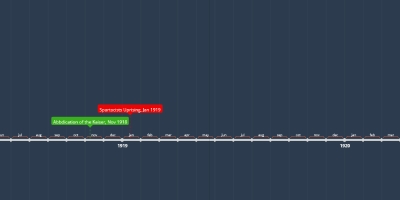jan 10, 1923 - Hyperinflation 1923-
Description:
Due to France and Belgium occupying the Ruhr and with Germany already in an economic crisis the Occupation of the Ruhr lead the Weimar government to the conclusion that they needed to print more money.With more money injected into the economy and the general strike, this meant that no goods were being manufactures which meant there was more money with fewer goods, combined with a weak economy after the war, this lead to hyperinflation.
As a consequence of more money the German currency lost all value including people who had saved for years and years. For example, in January 1923 a loaf of bread cost 250 marks but with the inflation by November a loaf of bread cost 200,000,000 marks. Also meaning, a persons savings where now worthless and before 1923 they could have bought a house but from 1923 onwards they could only afford bread. This also meant people wages rose significantly.
Added to timeline:
Date:
jan 10, 1923
Now
~ 102 years ago
